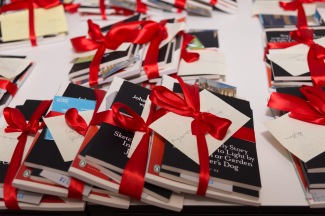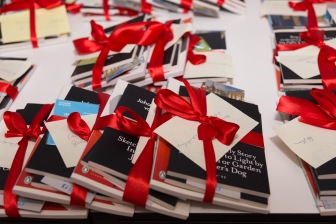One prizewinner in 2017’s ‘Deutsch(e) jenseits von Deutschland’, Beth Molyneux, first got involved with the Oxford German Olympiad right at its inception – and this year she was so enthused, she participated in every element of it that she possibly could! Beth was a joint winner in the ‘Migrating Communities’ essay category and a runner up in the Blog Post category. You can read her entries – and those of all the other winners – here.
In this blog post, she explains what got her involved in the first place and what she loves about the competition.
 The prize ceremony for the 2017 Oxford German Olympiad was the perfect culmination of what has been, for me and many other pupils around the country, an exciting, challenging and definitely worthwhile affair.
The prize ceremony for the 2017 Oxford German Olympiad was the perfect culmination of what has been, for me and many other pupils around the country, an exciting, challenging and definitely worthwhile affair.
My involvement in the Olympiad started when I was in Year 8, with the theme Grimm Tales and featured me and my sister as Hansel and Gretel in a short film. At that time, I wasn’t aware of what the Olympiad was but certainly had fun making the video. It then wasn’t until sixth form when I was looking to extend my German outside of my A-level that this memory from year 8 came back to me along with the remembrance that there had been a sixth-former at our school who had helped us with our entry as well as submitting her own. Excited by this prospect, I gave ‘Oxford German Olympiad’ a quick Google and was pleased to find that it not only still existed but had been going strong for several years and, most importantly, entries were open for this year’s competition!
What I loved about the structure of the competition was how all the tasks tied into an overall theme but were so diverse, both within and across the age categories, which gave me a chance to explore aspects of German and Germany that I never would have before. The Olympiad provided me with a great opportunity to do some wider study of German culture and literature as well as the linguistic challenge of composing an essay in German, which was especially useful because I’m hoping to study German at university. I liked the sound of all the tasks in my age category and wanted to get as fully involved as possible so, instead of choosing between them, I decided to have a go at all three.
I started with the essay on Germany’s colonial history, which was probably the hardest task from a language point of view, as well as requiring the most research yet despite this I’d say it turned out to be my favourite task. After collecting the necessary initial research to find out what the story of Germany’s empire actually was, I thought it would be very easy for this kind of essay to turn out quite stale and technical but I wanted to make it come alive with a literary touch so I developed an extended metaphor, comparing Germany’s association with colonialism to an actor on a stage. This meant that I not only learned something new about Germany’s fascinating and unique history but was able to get creative and really have fun with what is a truly beautiful language. I think my enjoyment of this task showed in my entry and it definitely paid off, as this piece was joint winner in my age category.

For the second task, I researched the Austrian German dialect, struggling to fit all its quirks into just 400 words and for the third I chose to write about the author Thomas Mann, one of the many authors who left Germany as the Nazis came to power. He nevertheless fought hard for his beloved country jenseits von Deutschland, as you might say. This entry epitomised the competition for me because Mann is such a remarkable example of this year’s Olympiad title. My research into his life and work has gone beyond the competition as I’ve explored German Exilliteratur, even choosing it as the focus for my Extended Project Qualification in sixth form. Again, I had a chance to get creative with this task, choosing to narrate his history as a story, with dialogue and literary features, rather than as an essay, which was yet another discipline I would never have explored without the Olympiad.
As the deadline for round one entries drew near and I was giving those final touches to my three pieces, I happened to check the Olympiad website again and was delighted to find that this wasn’t the end – there was a round 2! The tasks in round 2 were even more diverse, giving incredible scope for creativity. Having read some Kafka before, I enjoyed being mind-boggled as I read his Die Sorge des Hausvaters and barely knew where to start with a response. Having this chance to respond creatively to Kafka’s work helped me to delve deeper into his intentions and the thought processes behind his work as well as considering the weighty existential questions his work evokes.
The poetry of HC Artmann was, if possible, yet more bizarre than Kafka and undoubtedly a piece of literature which, without the Olympiad, I would never have been introduced to. The biggest challenge I faced in the HC Artmann task wasn’t understanding the German he used (helpfully provided alongside the original dialect version) but interpreting the poetry itself. Baffled, I simply chose to reflect this uncertainty in my response, writing two poems in response to his Kindesentführer, based on different readings of the poem which I had taken. Only Artmann himself knows whether either of my interpretations are correct (if there is ever a correct interpretation of poetry) but the responses were enough to win the prize for this competition, generously made possible by HC Artmann’s widow Rosa Pock.

Having submitted my grand total of five entries across Rounds 1 and 2 I felt not just immense satisfaction and pride at having accomplished this but also, most importantly, a passion for German literature, not initially kindled by this competition but certainly refreshed and burning brighter than ever because of it. I had dedicated a considerable amount of time to my entries and felt like I’d given a small piece of my heart and soul to the competition which was in a way its own reward. I probably didn’t realise how much the competition meant to me until I received the email with my results; I screamed so loudly that my parents came rushing upstairs thinking I had hurt myself! Besides the success itself was the exciting prospect of attending the award ceremony in Oxford at none other than the Bodleian library, an event which lived up to and surpassed expectations. I travelled down from Manchester with my Dad, the weather reflecting our mood in a sunny and more-than-usually beautiful Oxford and as we waited on the steps of the Weston Library, I realised the full scope of the competition as we saw students of all ages begin to gather. The event itself was incredibly well organised, managing to balance a comfortable and informal intimacy with the grandeur appropriate for a prize ceremony. Judges, organisers and participants alike were friendly, excited and welcoming. And the best part? With heavily book-based prizes, I left with yet more German literature to explore!
Beth Molyneux
Fancy having a go at the Olympiad yourself? The next competition is just around the corner! We’ll be announcing the theme for the Oxford German Olympiad 2018 later in September!


 Another reason that drew me towards entering the competition was the theme:
Another reason that drew me towards entering the competition was the theme: 